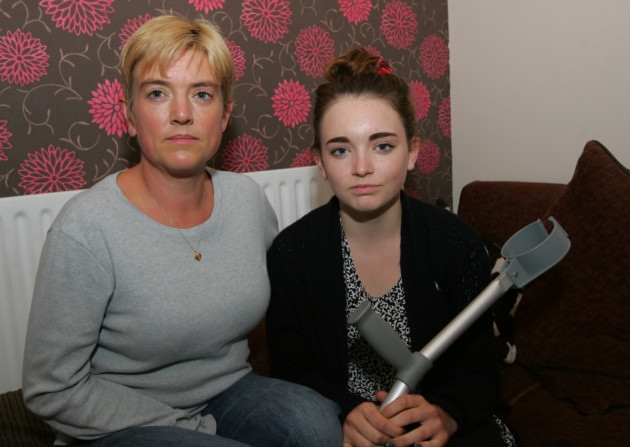
Gardasil Cervarix CFIDS/ME JCVI Pollard, Andrew
Is HPV vaccine safe? Hainault mum says daughter’s chronic fatigue is linked to cancer drug
15:57 24 September 2015
http://www.ilfordrecorder.co.uk

Lois Feldman's daughter Teagan had the HPV injection in 2011 and was diagnosed earlier this year with Chronic Fatigue Syndrome
Government data has shown more than 8,000 girls have reported adverse reactions to the HPV vaccine to prevent cervical cancer. Investigations journalist Emma Youle and reporter Hayley Anderson ask whether parents should be worried.
“I have still got my daughter but other parents have not been as lucky.”
These are the piercing words of Hainault mother Louis Feldman, 43, as she describes the impact that Chronic Fatigue has on the life of her teenage daughter Teagan.
Like millions of schoolgirls, Teagan had the Human Papilloma Virus (HPV) vaccine to prevent cervical cancer when she was 12, her mother believing it was in her best interests.
The vaccine has been described as “probably the most important thing ever done” to protect women’s health and is predicated to prevent up to 400 deaths a year from cervical cancer.
But not long after the jab Teagan became unwell, suffering from extreme exhaustion and a loss of concentration.
After years of ill health, she was finally told earlier this year she had Chronic Fatigue Syndrome (CFS), which causes unexplained muscle pain, and, in its severest form, can significantly reduce mobility, leaving some bed-bound.
Other teenagers have reported becoming ill after having the vaccine and Teagan’s mother is among a growing number who believe the health of their daughters has been harmed.
“Parents need to be warned of all of the potential side effects of the vaccine before allowing it to be given it to young girls,” she said.
Yet government health agencies insist it is safe and fear the clamour will affect the vaccine’s high uptake rate of 90 per cent and needlessly place the future health of young women at risk.
Prof Andrew Pollard, chairman of the government’s Joint Committee on Vaccination and Immunisation (JCVI), said: “We have no evidence of a safety signal with the vaccine.
“But what we do have is very clear evidence that this year 900 women, who have not received the vaccine, will die of cervical cancer, and the vaccine has the potential to prevent such deaths in future generations.
“So the place of this vaccine in defending women’s health is probably the most important thing we have ever done.”
Figures from the government body that monitors vaccine safety, the Medicines and Healthcare Products Regulatory Agency (MHRA), show 8,228 adverse drug reaction reports since the HPV jab was introduced, or one in 1,000 vaccinated girls. Seven relate to girls in Redbridge.
Of the total reports, 2,587 are classified as “serious” by the nurse or doctor logging it.
The MHRA admits the figures are high compared to other vaccination programmes, but says this is explained by the high number of doses given over the last eight years, the age of the girls who are old enough to voice concerns if they feel unwell, and the fact that the vaccine is given as two and previously three separate jabs.
A MHRA spokeswoman said: “The larger overall number of reports for the HPV vaccine compared to other vaccines gives no cause for concern.
“The overwhelming majority of these reports relate to known side effects that are usually mild, transient and common for most types of vaccine given to adolescents and adults.
“These figures cannot be used to compare the safety of different vaccines.”
In July the European Medicines Agency (EMA) launched a review to look at “rare reports” of PoTS and another condition called complex regional pain syndrome following the HPV vaccine after Denmark flagged up safety concerns.
Campaigners and doctors argue part of the problem is very little is known about the conditions.
PoTS expert and consultant cardiologist Dr Nicholas Gall sees about 20 girls a week with the illness and says there has been a “failure in medicine” to take symptoms in young women seriously with many simply referred to a psychiatrist.
Only a tiny handful of patients mention a link with the HPV vaccine but he believes it could be a trigger for PoTS in some very rare cases.
“I suspect if we understood the condition in any way we would say that in some people the HPV vaccine is the bit that sets it off,” said Dr Gall.
“But there isn’t really any data one way or the other and we should be doing more research.”
If you need support, or would like information about your case sent to the EMA, contact AHVID chair Freda Freda Birrell by mid October on jeanfreda8@btinternet.com or 07752 945 545. For more information on the HPV vaccine visit the NHS Choices website.